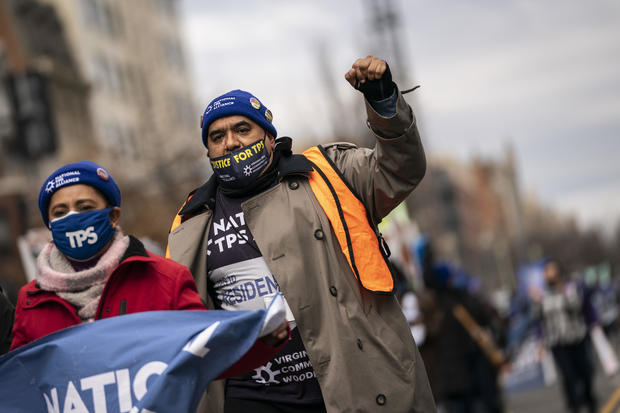[ad_1]
The Biden administration said Thursday it would extend immigration protections and work permits for 337,000 immigrants from El Salvador, Nicaragua, Nepal and Honduras through the summer of 2024, blocking a decision by the court may end their legal status next year. .
The Department of Homeland Security (DHS) said in an announcement that it will allow immigrants from these countries to continue to live and work in the US legally under the Protection policy People’s Protection Program (TPS) until June 2024. Created in 1990, TPS is a relief program that allows the US to reach out to people in countries affected by armed conflict, natural disasters or other human problems.
Thursday’s announcement comes two weeks after court negotiations between the Biden administration and lawyers representing TPS holders. break downpaving the way for the Trump administration’s decision to end the legal status of hundreds of thousands of immigrants who have entered the program to become legal.
Drew Anger/Getty Images
But in its announcement Thursday, the DHS said immigrants from El Salvador, Nicaragua, Nepal and Honduras will keep their work permits and immigration protections for at least 365 days after being approved. of the agency to end the TPS programs in question, until June 30 , 2024 — whichever date comes later.
The June 30, 2024 extension will also affect some Haitian and Sudanese immigrants, but they will still be able to apply for work permits and deportation protections under the announced expansions of the TPS programs for Haiti and Sudan and the Biden administration will not be affected by the lawsuit. in the relevant court.
“DHS is well aware of the importance of Temporary Protected Status (TPS) in ensuring people’s livelihoods,” a DHS spokesperson said in a statement to CBS News on Thursday.
By the end of 2021, 241,699 Salvadorans, 76,737 Hondurans, 14,556 Nepalis and 4,250 Nicaraguans were enrolled in the TPS program, according to US Citizenship and Immigration Services (USCIS) data.
TPS allows beneficiaries to live and work in the country without fear of deportation, but does not give them a path to permanent residency or citizenship. Those who lose their TPS protections may be deported if they apply for, and are granted, another immigration benefit.
As part of its immigration crackdown, the Trump administration tried to end TPS programs for hundreds of thousands of immigrants from El Salvador, Haiti, Nicaragua, Sudan, Honduras and Nepal. But those terminations were blocked in federal courts by lawsuits that said the terminations stemmed from unjustified racial animus.
However, in September 2020, the 9th Circuit Court of Appeals gave the Trump administration the go-ahead to end the TPS program, stating that the courts cannot review DHS decisions about to the policy. However, the ruling did not take effect, as lawyers for TPS holders asked the court to consider retrying the case “en banc,” with all active judges involved.
The Biden administration, which has vowed to stop deportations of TPS holders to “unauthorized” countries, has been involved in court negotiations to try to resolve a lawsuit over Trump-era termination orders. It also formally expanded TPS programs for immigrants from Haiti and Sudan.
After a year of court negotiations, lawyers for TPS holders announced on October 26 that they had not reached a settlement with the Biden administration. Both sides are now waiting for the 9th Circuit to decide whether to grant or deny the request for a retrial.
If the request is denied, the 9th Circuit’s decision will take effect in September 2020, unless the Supreme Court intervenes.
Ahilan Arulanantham, one of the lawyers representing TPS holders in the lawsuit, called Thursday’s announcement a “huge victory.” But he called it a “space.”
“Despite today’s extension, the Biden administration continues to defend Trump’s racist TPS termination decisions in court, and if the Biden administration does not act, they will remain on the books,” said Arulanantham, co-director of the Center for Immigration Law and Policy at the UCLA School of Law.
Arulanantham called on the Biden administration to create new TPS programs for El Salvador, Nicaragua, Nepal and Honduras, as it did for Haiti and Sudan.
Democratic lawmakers have pushed for TPS holders to be allowed to apply for permanent residence as part of a bid to legalize undocumented immigrants who have been in the U.S. for years. Many TPS holders have lived in the country for over twenty years. The TPS program for El Salvador, for example, began in 2001.
But Democrats and Republicans have been unable to forge a deal on immigration for decades, and GOP lawmakers have resisted enacting legislation without any change in policy. American territory.
[ad_2]
Source link


